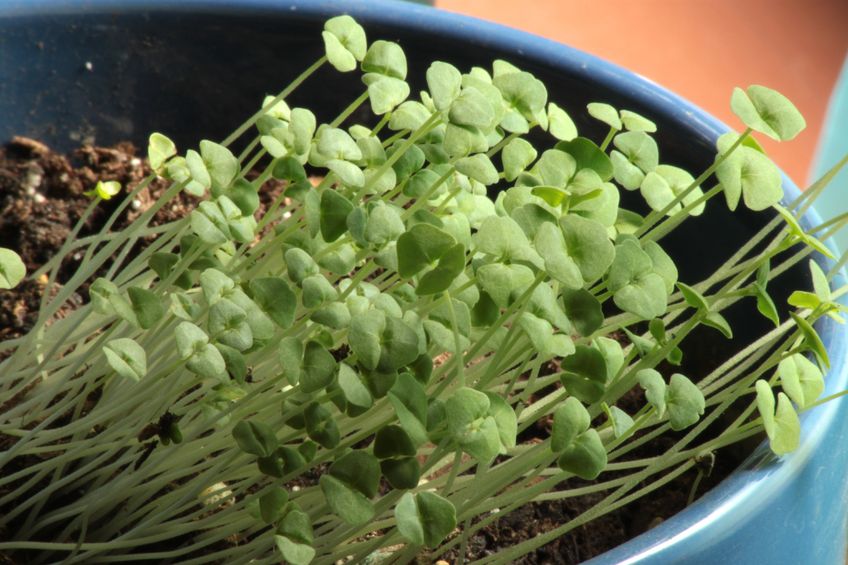Chia Seeds - Salvia hispanica

Common Names: Chia, Chia Seeds, Runner's Seeds, Salvia hispanica, Mexican Chia, Salba, Spanish Sage
Latin Name: Salvia hispanica
Origin: South America, North America
Short Introduction
Salvia hispanica is cultivated for its highly beneficial chia seeds in several countries across North and South America. While chia prefers sandy soil, it can also thrive on dry, rocky slopes—though growing it can be a challenge.
Detailed Description
Chia seeds are valued for their high energy content, vitamins, fiber, and many beneficial nutrients, making them suitable for all ages and a wide range of diets.
Botanical Information
Salvia hispanica is an annual plant that can reach a height of up to 80 centimeters. It features a square stem surrounded by green, velvety leaves, which are veined and pointed at the tip. The flowers are typically blue to purple, but white blossoms can also occur.
The chia seeds themselves are tiny oval shapes, about a millimeter in size, ranging in color from white to brown. Their color is determined by the flower: white flowers produce white seeds, while blue-purple flowers yield brown seeds. The light seeds are referred to as "salba," while the darker or mixed seeds are known as chia. Both types are highly nutritious and complement each other perfectly.
Origin and Distribution
Chia seeds have a history stretching back over 4,000 years in Mexico, where the Aztecs and indigenous peoples used them as an energy source during long journeys and even as a form of currency. This long-standing tradition highlights their ongoing value across generations.
Usage / Dosage
Chia seeds are suitable for everyone due to their neutral flavor, making them a wonderful addition to juices, puddings, porridge, yogurt, and countless everyday meals.
Chia seeds are rich in protein, an essential component for athletes and anyone with high physical demands. The protein content in chia seeds is almost double that of most other seeds, making up about a fifth of their weight!
A unique property of chia seeds is their ability to absorb up to twelve times their weight in water. When mixed with water, they form a gel or pudding, which allows for slow and efficient hydration—hence their nickname "runner's food." This gel also expands in the stomach, creating a feeling of fullness and making chia seeds highly beneficial during weight-loss diets. Additionally, they are an excellent choice for those following a gluten-free diet, as chia contains no gluten.
The chia gel also acts as a natural barrier in the stomach, slowing down digestive enzymes and carbohydrate-to-sugar conversion, helping to stabilize blood sugar levels. Because of this, chia is particularly beneficial for those with diabetes.
With their exceptional calcium content—five times more than milk—chia seeds are a valuable supplement for children. The presence of boron supports calcium absorption, strengthening bones. Anyone concerned with brittle hair and nails should also consider adding chia seeds to their diet.
Chia seeds are also known for their antioxidant properties. Regular consumption helps protect against free radicals, supporting overall cellular health.
Active Compounds
Chia seeds (Salvia hispanica) are rich in zinc, copper, boron, calcium, fiber, protein, manganese, magnesium, iodine, iron, potassium, phosphorus, and a wealth of vitamins and beneficial compounds for the human body. Notably, they boast a very high content of Omega-3 fatty acids, accounting for 60% of their total fat profile. Boron, an essential mineral, is also present and plays a significant role in bone and dental health.
Traditional Dosage
The optimal daily amount of chia is two tablespoons (approximately 25g) to maximize health benefits; this can be increased during times of greater physical or mental exertion.
To prepare chia gel, mix 1 part chia seeds with 10 parts water. Allow the mixture to sit briefly until a gel forms, which can then be eaten alone or mixed with other nutritious foods or supplements—for example, combining chia gel with hemp protein for an added protein boost, especially valued by athletes.
Warning: Chia seeds contain Omega-3 fatty acids, which may thin the blood and lower blood pressure. Therefore, chia is not recommended for individuals with low blood pressure or those taking blood-thinning medications such as warfarin.
